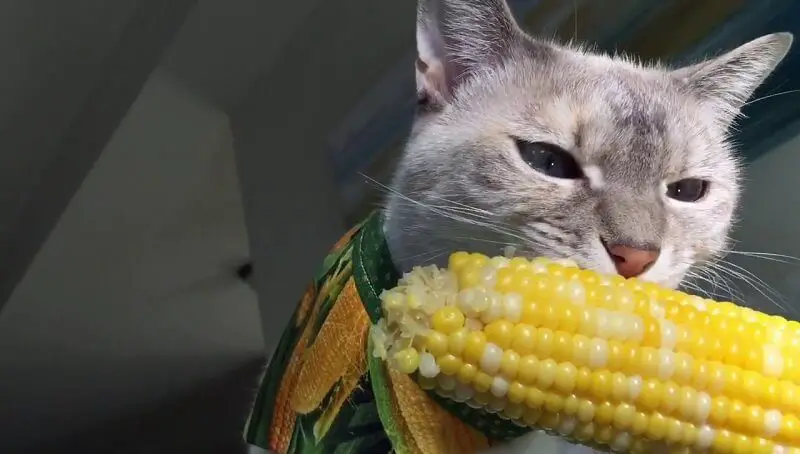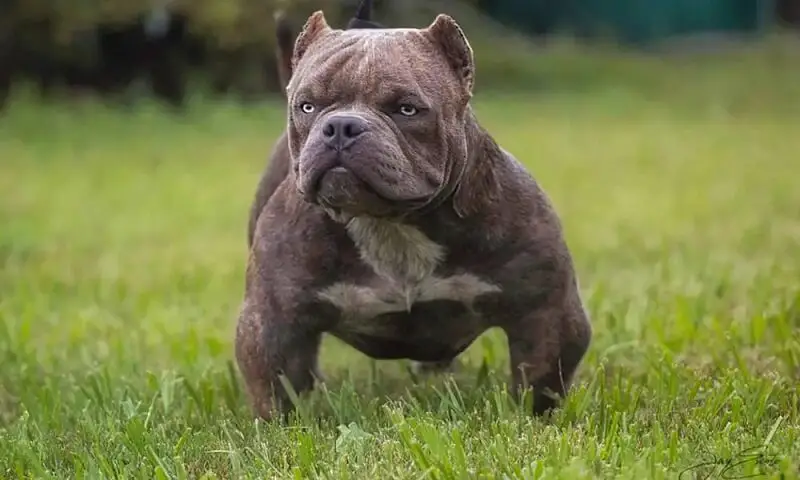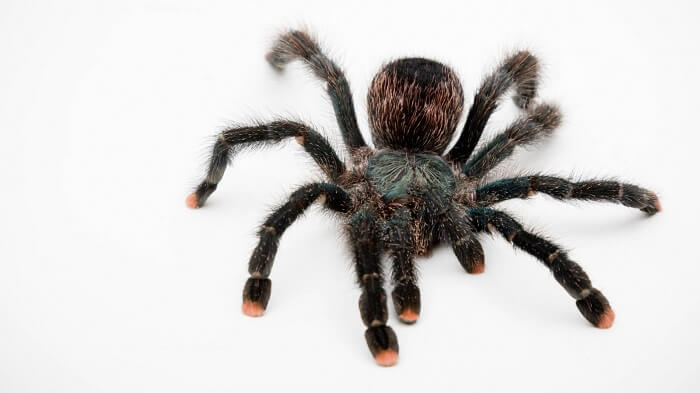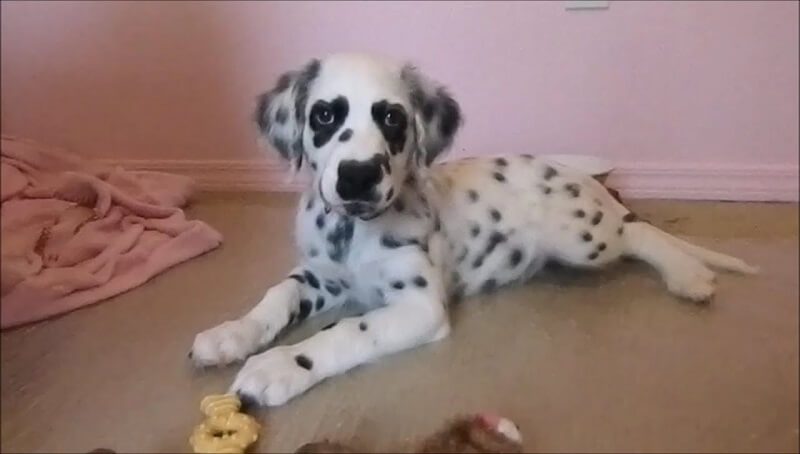Corn is the world’s most popular cereal seed. It is an excellent resource because of its many useful nutrients and, in addition, it has a great taste. If you happen to prefer corn or corn-based products, then you may be tempted to feed them to your cat as well.
However, can cats eat corn?
Of course, your cat can eat corn and corn-based products. Thanks to its fiber content and availability, corn is a common ingredient in most snacks and pet foods found in shops. If you didn’t feed your cat corn, it might have already had by eating a pet can.
Can cats digest corn?
Yes, cats can digest corn. However, it does not meet the protein requirements of cats. Maize plant proteins are incomplete and lack the amino acids necessary for the normal growth and development of these basic carnivores.
Are cats allergic to corn?
Corn is listed among the biggest cat allergens. Some cats can tolerate corn in small quantities, while others are more sensitive and will not even take a small quantity of corn. If your cat shows an allergic reaction after eating corn, contact your veterinarian immediately.
You might also like my articles on whether cats can eat shrimp, mushrooms, beef, and venison.
What I would suggest is just to give your cat a small amount of corn, and then wait to see if your cat shows any symptoms of food allergy. Also, the most typical allergic effect in corn could be continuous skin scratching.
Common allergic reactions include hissing breathing, coughing, sneezing, irritated and itching skin. Some cats may also show some gastrointestinal symptoms, such as vomiting and diarrhea. Even if your cat is not allergic to corn, you should limit its consumption of corn only as a snack.
The benefits of corn in cats
Corn is rich in carbohydrates, but how can they support the nutritional needs of your pet?
- They are an important source of energy.
- They can supply fibers, vitamins, minerals, fatty acids and even proteins.
- It helps protect the muscles – especially in cats.
Can cats eat corn on the cob?
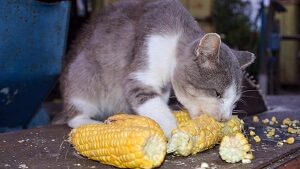 You can feed your cat just small portions of corn on the cob, without adding any salt, sugar, or butter. And that, only if your cat is not allergic to corn. The cob is hard to digest and the kittens should not be fed with it.
You can feed your cat just small portions of corn on the cob, without adding any salt, sugar, or butter. And that, only if your cat is not allergic to corn. The cob is hard to digest and the kittens should not be fed with it.
Can cats eat corn starch?
Corn is not a common source of allergen in cats and corn starch appears to be less of an allergen than its flour. Pet food containing corn starch as a source of carbohydrates is preferred for cats suspected of a corn allergy, and not only.
Can I give my cat sweet corn?
Cooked and simple sweet corn can be fed to cats in small amounts, as long as your cat is not allergic to corn.
Can cats eat the popcorn?
Uncooked corn kernels represent a potential choking hazard for your cat. In addition, they are hard to chew and can damage the teeth of your pet.
One or two popcorn pieces are not harmful to your cat, if swallowed. But this food can seriously damage your cat’s health if it is ingested in large quantities.
In addition, human-quality popcorn is often consumed together with other spices, other than simple salt. There are additives in popcorn, especially in easy and convenient popcorn, which make it dangerous and even toxic to cats. Restrict cat’s access to pre-made popcorn varieties, with a special emphasis on popcorn containing significant quantities of onions, garlic, butter or salt. These spices are extremely harmful to your cat.
Can cats eat corn husks?
No, cats cannot eat corn husks. Cats cannot digest corn fiber. If ingested, corn peels can cause digestive problems in cats such as diarrhea, stomach pain, vomiting, and appetite suppression.
Excessive salivation was also observed as one of the symptoms. In severe cases, it can also lead to intestinal blockages.
What to do if your cat eats corn husks
Corn husks are not toxic or poisonous to your cat. But you must contact your veterinarian if your cat has ingested corn husks.
If your cat shows any of the symptoms mentioned above related to the ingestion of corn husks, seek medical assistance instead of self-medication.
Self-medication can further aggravate the situation. To avoid such a situation in the future, you must keep the corn husks away from your cat.
Can cats eat corn flakes?
Corn flakes from known producers can be with no sugar and salt added, which may be a great option of a treat for your cat. Even though it is rich in fiber, it is not as good as offering your cat cereals like oats and rice. This happens because corn fiber is harder to digest
Can cats eat corn chips?
Corn chips are not a prohibited snack, but as you might guess you should rather avoid giving them to your cat.
Like any other type of chips, corn chips are also full of all types of spices, lots of salt, and additives for flavors. As it is a manufactured product, obviously is rich in salt and you should avoid offering your cat any type product containing it.
Cats will drink a lot of water when eating something with salt and their kidneys might not handle an extreme fluctuation.
Can cats eat corned beef?
Corned beef is safe for cats, as it contains red meat and cats are typical carnivores.
The most important thing is to check the meat to be well cooked, cause if not, bacteria will grow and might give your cat all sorts of digestive problems.
Corned beef is not very rich in nutrients, nor will it make your cat sick.
Can cats eat corn tortillas?
Tacos and other types of bread such as tortillas, quesadillas may be tolerated by cats in small quantities, provided that these types of bread are not seasoned.
Tortillas have different gluten content, which can be digested by cats in limited amounts.
Tortilla does not meet the nutritional requirements of your cat. Cats are carnivorous and need food of animal origin for optimal growth. The digestibility rate of carbohydrates in cats ranges from 79% to 97%.
If you were feeding your cat mainly corn or other vegetables and beans, then it will be quickly affected by malnutrition which can cause serious health problems for your cat. For this reason, it is not recommended to allow your cat to eat corn or other cereals frequently. These types of food can be offered as regular treats, however, not as a main course at any cost.
